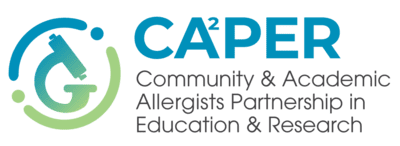The College’s Community and Academic Partnership in Education and Research (CA²PER) program was launched in 2025, to encourage collaboration in clinical research.
Building on the success of the CAPE program to foster partnerships in education, CA²PER brings together academic and community allergists to conduct practice-based translational research.
The College has allocated $100,000 per year in grant support over a period of three years (2025-2027) for projects that address research questions of relevance to clinical practice that are ultimately important for improving allergy and immunology care.
Read the Funding Opportunity Notice to see the projects we will consider for funding in 2026, learn about our past grantees, and submit a Letter of Intent (LOI). Listen to our 2025 grant recipients discuss their motivation for applying.
Below are key dates, eligibility criteria and resources to help strengthen your application.
Grant Application Timeline
- Letter of Intent Deadline: Jan. 15, 2026
- Pre-selected Applicant Notifications: Feb. 16, 2026
- Full Proposal Deadline: April 30, 2026
- Award Notifications: June 1, 2026
NOTE: Incomplete or poorly written Letters of Intent (LOIs) will not be considered. Please be sure to provide all the required information and proofread the content of your LOI to maximize your chances of receiving an invitation to submit a full proposal.
Eligibility
Applicants must meet the following eligibility criteria:- ACAAI Membership: The Principal Investigators (PIs) must be members of the College in good standing and reside/practice in the US or Canada. Fellows-in-Training cannot serve as PIs but are encouraged to be part of the research team.
- MPI Model: Research teams must consist of at least one academic allergist PI and one private/community practice allergist PI. You will be asked to provide NIH-style biosketches for your PIs with your LOI and if selected for the full proposal, biosketches for your key investigators.
NOTE: The academic PI must have a faculty (teaching/research) appointment at an academic institution and dedicate at least 80% of their time to activities in an academic setting. The private practice PI must dedicate 80% of their time to clinical activities in a private/community practice setting. Both PIs must contribute at least 10% of their time for the oversight of the project.
Partnership Requirements
A crucial component of a successful CA2PER research project is having a strong partnership between academic and community-based allergists. To be selected for the program, teams must have equal collaboration, rotating responsibilities, shared tasks, co-presentation and co-publication, regular communication and deliver the investigative goals. Gain insights from the inaugural grantees on how they share responsibilities on their project. Below is what will be expected of teams selected to be part of the program.- Equal collaboration: A full commitment by the principal investigators (at least one academic and one community-based) who will collaborate equally in directing the research project and share credit.
- Rotating responsibilities: Duties can be rotated, but the PIs will remain equal partners.
- Shared tasks: PIs will share tasks such as experimental design, resource allocation, supervision of staff, financial management, data sharing, and timely submission of publications.
- Co-presentation and co-publication: PIs agree to co-present and co-publish the research. Annals of Allergy, Asthma, and Immunology will be given first right of refusal to publish the research findings.
- Investigative goals: PIs will participate in composing and delivering the investigative goals that are consistent with CA²PER and Good Clinical Practice guidelines (see the Resources section below for additional information).
- Regular communication: Frequent and consistent communication should be maintained between the PIs to keep the project on track.
- Administrative Contact: Each grantee will need to designate an administrative contact who will manage all communications between the College, PIs, research teams and participating organizations (e.g., university pre-/post-award office and the community A/I practice).
Learn more about our 2025 grantees and watch a video on how they envision their project supporting other allergists.
Resources
Hear directly from our 2025 recipients as they share advice on applying.
Clinical Research: Is It Right for You? Learn whether implementing a clinical research program is a good fit for your practice. This 15-minute educational module covers:
- The pros and cons of implementing a clinical research program in private practice
- What you need to get started
- Considerations when choosing a clinical research study
- Make a compelling case for your project idea
- Meet the grant review criteria
- Assemble your project team
- Develop your budget
- Avoid common mistakes
CA2PER Symposium
If you missed the symposium at the College’s 2024 Annual Scientific Meeting, check out the recorded presentations on the following key topics:
- So You Want To Do Human Subjects Research – What Are the Requirements?
- Constructing and Using Patient Databases – Perils, Pitfalls and Potentials
- Office-based Research – What Does It Really Involve?
- CA2PER – What This Partnership Can Mean to Our Members and Our Patients
How to Apply
If you believe your project is a good fit for the CA2PER program, be sure to submit a Letter of Intent no later than January 15, 2026. LOIs submitted after the deadline will NOT be considered.
Questions? Contact Katerina Barcal, MPH, ACAAI Associate Executive Director.

